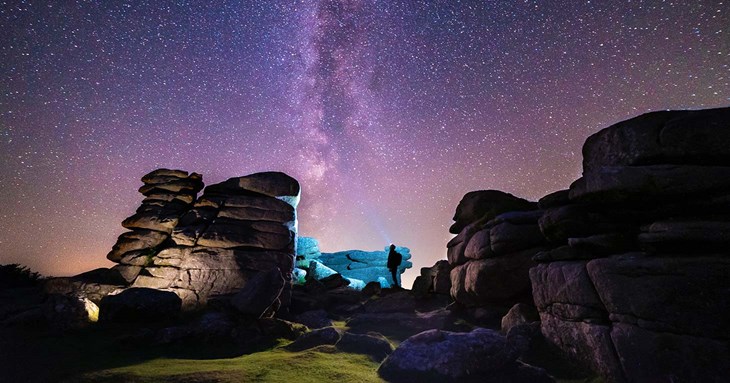Enjoy the night sky during Devon Dark Skies Week
Published: 19 October 2021

People are being encouraged to enjoy Devon’s dark skies and find out more about light pollution and how they can protect wildlife in their own back yards.
Devon Dark Skies Week runs over Half Term from 22 to 30 October. The week invites people to experience the magic of Devon’s dark skies, learn more about nocturnal species and find out how to reduce light pollution.
The event is being organised by the Devon Nature Partnership.
There’ll be a chance to follow events and information on social media and get involved in two fascinating Dark Skies Week webinars.
- An introduction to moths and their declines takes place on Monday 25 October at 7pm. Richard Fox from Butterfly Conservation, will provide a basic introduction to moths, an overview of the causes of their declines, and insights from recent research on the effects of street lighting.
- The importance of the night sky and getting lighting right takes place on Thursday 28 November at 7pm. Bob Mizon MBE (UK Commission for Dark Skies) will focus on the night sky and the benefits of getting lighting right whilst Ivan Buxton (Devon Campaign to Protect Rural England) talk will focus on what we can do as individuals and communities to reduce the negative effects of lighting.
Visit the Devon Dark Skies web page at https://www.devonlnp.org.uk/joint-initiatives/devon-dark-skies/ for more information about dark skies, activities, and simple things that can be done to reduce light pollution.
Organisers want to hear about any dark skies activities that have been planned during the week and are keen for people to share their posts and using the hashtag so we can look out for and share your posts. Keep up-to-date and join the conversation on social media using #devondarkskies.
Any night-skies photos can also be shared with the organisers.
Tips to reduce the adverse impacts of artificial lighting include:
- Avoid using lighting! Artificial light is hugely beneficial in some situations. However people should always think twice as to whether it is essential.
- Reduce light spill. Design lighting to minimise light spill into areas where it isn’t required for example, through the design of the light fitting, use of walls / fences / dense vegetation to block light, or shutting curtains at night.
- Ensure that lights are only on when required. Use motion sensors, timers for street lighting or just switch off lights that aren’t needed.
- Reduce brightness. Lighting should only be bright enough to fulfil its function. Reduce brightness through choosing blubs with lower lumens. If trying to keep an area dark for wildlife such as a dark corridor, the light levels entering the habitat should not be greater than the normal night light levels or 0.4 lux vertically and 0.2 lux horizontally.
- Use warm lighting. Where possible use warm LED lighting of 2700K or less to reduce the blue/UV component. Warmer light reduces impacts on wildlife, human health and sky glow.
Exmoor’s Dark Skies Festival coincides with Devon Dark Skies Week, running from 22 October to 7 November. This includes a huge variety of events, such as stargazing, owl experiences, art exhibitions, and bat watching, suitable for a whole range of ages.
